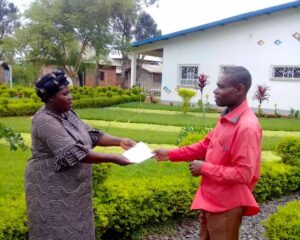
This is the sixth part of a series by Abraham Leno, our executive director, called “How to Survive a Disaster.”
Read the rest:
- Lessons from eastern Congo
- Disaster is a part of life, and you are not alone
- Survival builds expertise
- In a crisis, you learn what business you’re in
- Be powerful when you can
- Humanity matters more than anything
- You can still have joy
Emergencies focus the mind on the here and now. When you are very sick, starving, or running for your life, you cannot think very far ahead. That is why those of us who serve some of the most financially constrained people on earth must be very careful to consider how our actions will live on in the memories of those who survive.
A disaster, even a very long-lasting one, has a beginning and an end. It is important to remember that we were human before the disaster, and we will be human after the disaster too. During times of crisis, our most important duty is to meet people’s most immediate needs — safety, shelter, medical care, food and water. But everyone’s humanity transcends those urgent needs.
That is why we at ECI build our activities and our organization around human-centered design. We do not provide products and services for the “vulnerable” or for “crises,” but to meet the needs of human beings who happen to find themselves in exceptionally challenging situations.
During the coronavirus pandemic, health care workers worldwide have begun sharing this lesson very clearly. One New York physician instructed young doctors to hold the hand of every dying patient, and to pause for a few moments of silence to mark the passing. “This helps us retain our humanity in times of such crisis and gives our patients’ families some solace that they were treated with dignity,” he said.
In Congo, ECI extends this principle to everything we do. We believe in what we call “radical quality”: if the work we are doing isn’t good enough to share proudly with anyone, anywhere in the world, then it is not good enough for the Congolese communities we serve. That is true at the best of times, and just as true today.
My colleagues and I know where we work are and the challenges we face. Although we did our best to prepare for the coronavirus pandemic, most personal protective equipment is simply not available in the places where we work. In one province, we have counted 25 ventilators to serve about 6 million people. Now that national borders have been closed and travel restrictions are in place, vital supply chains may not be restored until the pandemic is over. That means our clinicians may run out of protective gear, disinfecting supplies, and even basic medicines — even as more sick patients come to us for help.
What will our doctors and nurses do then? Simply put, they will do their very best, no matter what. Even if they no longer have enough medications, they can provide space and time for patients to lie down in peace and safety. That may not sound like much. But in a crisis, humanity matters infinitely more than all the equipment in the world.
Next: Will you ever be happy again?
Photo: On April 10, Mama Salomé shares a brochure about COVID-19 information with a visitor to an Asili clinic.
